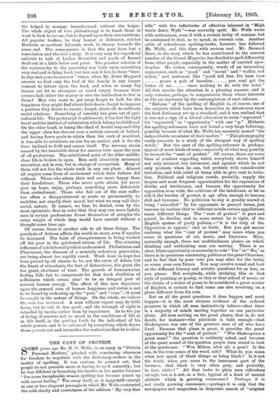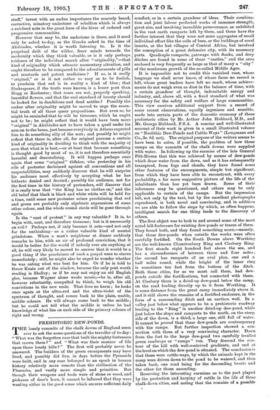Q OME years ago Mr. H. G. Wells, in an
essay in "Certain 1.-.3 Personal Matters," pleaded with convincing clearness for freedom to negotiate with the dictionary-writers in the matter of spelling. It was curious, he pointed out, that people do not grumble more at having to spell correctly ; but he was diffident in broaching his doubts on the matter because "for some inexplicable reason spelling has become mixed up with moral feeling." The essay itself, as it happened—except in one or two eloquent passages in which Mr. Wells contrasted the cold clarity and correctness of the address "My very dear
wife" with the infinitudes of affection inherent in "Migli verrie deare Wyfe "—was correctly spelt. Mr. Wells wrote with enthusiasm, even if with a certain levity of manner, but he continued to deal, so to speak, in current coin. Another critic of schoolroom spelling-books, however, has followed Mr. Wells, and this time with serious zeal. Mr. Bernard
Shaw, in the story which he has contributed to the current number of the Grand Magazine, has decided to spell differently
from other people, especially in the matter of omitted apos- trophes. He writes, consequently, words of an interesting appearance, such as " youd " and " havnt" and " walkin and talkin," and sentences like " youll tell him lye been here youre a pair of beauties you cant get the better of me weve nothing to do with the hotel." All this arrests the attention in a pleasing manner, and it only remains, perhaps, to congratulate those whose interests in life are increased by the contemplation of such reforms.
" Reform " of the spelling of English is, of course, one of the subjects which have been favourites in debate ever since the first dictionary set up a standard, and it was realised that it was not a sign of a liberal education to write " seperated " for "separated," or " opportunity " with one "p." Hitherto the spelling-reformers have not found a very large following, possibly because of what Mr. Wells has earnestly named "the indescribable meanness of their motive." "This phonography really amounts to a study of the cheapest way of spelling words." But the cant of the spelling-reformer is, perhaps, typical of most kinds of cant,—especially of what may possibly be termed the "cant of protest." Of course, there are some lines of conduct regarding which everybody shows himself not only inimical, but intolerant, and against which he not only protests when he can, but protests with considerable irritation, and with relief at being able to give vent to irrita- tion. Political and religions creeds, probably, supply the largest and most frequent opportunities for the expression of dislike and intolerance, and because the opportunity for opposition is so wide, the criticism of the intolerant, or let us call it the burden of protest, is apt often enough to become dull and tiresome. No politician to-day is greatly moved at being " miscalled " by his opponents in general terms, just because he realises that to different minds certain appellations mean different things. The "cant of protest" is part and parcel, he decides, and to some extent he is right, of the English system of party politics,—" it is the duty of the Opposition to oppose," and so forth. But you get nearer realising what the "cant of protest" may mean when you come to questions of art, music, and literature. Here, naturally enough, there are multitudinous planes on which thinking and unthinking men are moving. There is no clear, blunt opportunity or necessity to vote " Yes " or " No," as there is in questions concerning politics or the great Churches and to feel that by your vote you may alter for the bette; or worse your own future. You may revolve round and look at the different literary and artistic questions for as long as you please. But everybody, while studying this or that style of painting or poetry, or this or that school of music, or the claims of a writer of prose to be considered a great master of English, is certain to find some one else revolving on a plane different from his own.
But on all the great questions it does happen and must happen—it is the most obvious evidence of the ordered progress in which all men instinctively believe—that there is a majority of minds moving together on one particular plane. All men moving on the great planes, that is, do not doubt, for instance—the platitude is bald enough—that Shakespeare was one of the greatest men of all who have lived. Because that plane is great, it provides the great opportunity for the "cant of protest." "Was Shakespeare a great man?" the question is suddenly asked, and because of the queer sound of the question people turn round to look at the questioner. "Was Milton, after all, a poet ? Is the sea, in the true sense of the word, salt P What do you mean when you speak of black things as being black P Is it not the truth, when you come to the innermost part of the business, that black is very often grey, and probably,. in fact, white ? " All that looks to plain men ridiculous enough, but is it not, as a fact, typical of a kind of mental attitude which is growing commoner ? Perhaps it is not really growing commoner,—perhaps it is only that the newspapers and magazines, in desperate search of "original
stuff," invest with an undue importance the scarcely heard, corrective, minatory undertone of rebellion which is always a subdued note in the great hum of the hives of ordered and progressive communities.
However that may be, the undertone is there, and it need only be asked to-day, as the Greeks asked in the time of Alcibiades, whether it is worth listening to. Is it the perpetual drift of the wilder, freer minds towards the modernity which they think valuable, or is it only perhaps evidence of the individual search after "originality,"—that kind of originality which attracts momentary attention, and ought therefore to be compared to the advertisements of pills and mustards and patent medicines ? If so, is it really "original," or is it not rather so easy as to be foolish, to proclaim that red is in reality a kind of blue ; that Shakespeare, if the truth were known, is a lesser poet than Hogg or Rochester; that roses are not,, properly speaking, beautiful flowers, and that the real standard of beauty should be looked for in dandelions and dead nettles ? Possibly the seeker after originality might be moved to urge the essen- tial truth of all those queer propositions. But even so, he might be reminded that he will be tiresome, which he ought not to be ; he might reflect that it would have been more "original" in Alcibiades not to have taken a quail under his arm on to the bema, just because everybody in Athens expected him to do something silly of the sort; and possibly he might reflect that there is, after all, for original persons a certain kind of originality in deciding to think with the majority of men that what is is best,—or at least that because something is thought good by most of us, it is not therefore essentially harmful and demoralising. It will happen perhaps once again that some "original" thfhker, who yesterday in his role of protester declaimed against all conventions and all respectabilities, may suddenly discover that he will surprise his audience most effectively by accepting what he has hitherto denied and decried ; possibly his audience, not for the first time in the history of pretenders, will discover that it is really true that "the King has no clothes on," and the old belief that black is black and white white will be held for a time, until some new protester arises proclaiming that red and green are probably only algebraic expressions of some other colour, and the whole round circle will be gone through again.
Is the "cant of protest" in any way valuable P It is, to begin with, cant, and therefore tiresome; but is it necessarily an evil ? Perhaps not, if only because it acts—and not only for the unthinking—as a rather valuable kind of mental grindstone. When a man's neighbour at dinner suddenly remarks to him, with an air of profound conviction, that it would be better for the world if nobody ever ate anything at all, he will very likely be moved to answer that it would be a good thing if the proclaimer of such a gospel were to starve immediately ; still, he might also be urged to wonder whether he was eating what was best for him. Or if he is told to throw Keats out of the window, because the only poet worth reading is Shelley; or if he may not enjoy an old English glee, because Wagner alone wrote music,—he is, after all, however reluctantly, compelled to think, to weigh his old convictions in the new scale. That does no harm ; he looks
once again at the ultra-red and the ultra-violet of the spectrum of thought, and comes back to the plain, usable, middle colours. He will always come back to the middle; but he could not tell what the middle is unless he had knowledge of what lies on each side of the primary colours of right and wrong.
PREHISTORIC DEW-PONDS.







































 Previous page
Previous page